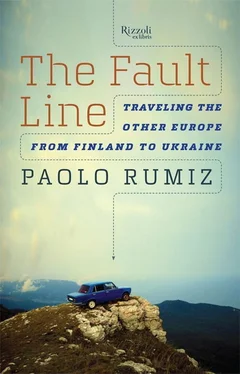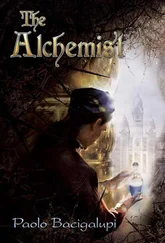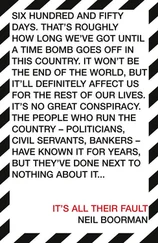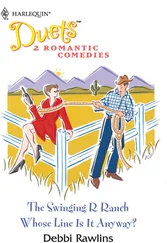Vitaly is not afraid to talk. He wants the whole story to be known, hopes that the rich West will help him, at least in the name of the sanctity of Christmas. “If Gazprom and the other two mines join forces against us, good-bye reindeer. Write about it. We have asked that they build infrastructure that is environmentally compatible, but I’m afraid they won’t listen to us.” He outlines the stages of an implacable siege. “They want to take away our concession over the forests; they have bought our slaughterhouse, and now they’ve even sold our fluvial fishing rights. Let’s not talk about the fishing in the Barents Sea; it’s all in the hands of the multinationals, while the local people have only the right to a minimum quota of fish.”
When it comes to tourism, it’s open warfare. It spreads like an herbicide, with the corrupt complicity of the usual chinovnik , the local government functionary, described perfectly by Chekhov. Here water and land, lakes, rivers, and hills are all mixed together in a labyrinth, and here for millennia, hunters have also been fishers. Well, now, while for the “natives” fishing is limited to the minimum for survival, the largest bodies of water are handed over for twenty years to be managed by an English company, which organizes luxury camping tours for salmon fishing. One and a half million acres of forest have been put up for sale, forests where the reindeer have been grazing for millennia. Rivers with legendary names such as Rynda, Olyonka, Kharlovka, Varzina, and Sidorovka have been given in concession to foreigners, and Santa Claus’s reindeer constantly find their passages to the seaside blocked. “Russia no longer belongs to the Russians, believe me.”
Tatiana lights a candle under the icon of Saint Nicholas. She explains that the reindeer give everything they have: fur, meat, milk in the dead of winter, building materials (bones and antlers) even where trees don’t grow. They are uncontaminated animals, the quintessence of therapeutic purity. They spread out on the land so as not to use it up. They eat moss, mushrooms, dry grass, and when there’s nothing else, even algae from the sea. They draw their strength from the womb of the earth. They don’t need vaccines because the cold kills off the most tenacious germs and prevents the spread of infectious diseases. Kola is one of God’s gardens. But the global has no respect for the sacred, and the herdsmen know no peace. For them there is no Santa Claus to save the day in his sky-blue sled. The very countries that celebrate him are killing off his symbolic animals.
In the languages of the Great North, the Arctic peoples are known by a name that means simply “man.” They live in the great void, almost always alone with their animals, and they never think even in tribal categories, let alone nationalistic or imperialistic ones. Man has no need of adjectives to be recognized in the great white spaces. It’s not important that he distinguish himself from the other men, only from the bears, the wolves, the hare, or the reindeer. When he leaves the great solitude to return to the world of supermarkets and mobile phones, it happens that he feels more like his animals than the civilized bipeds that he meets on the street. “When I go into the city,” Vitaly smiles, “the people horrify me so much that it’s not hard for me to feel a sense of brotherhood with a reindeer. Or even that I feel, quite simply, that I am a reindeer.”
Tatiana cuts a slice of salted reindeer meat and a golden loaf of bread. She explains: “People here didn’t know what bread was before the Russians came. And a lot of Russians came here during the Stalin years to avoid the Gulag. Those who were threatened with arrest moved of their own accord to the less desirable parts of the country, and Kola was one of them. Otherwise, there’s no way to explain the large influx. There aren’t just miners and soldiers.” Vitaly’s grandparents came to Lapland from Arkhangelsk and brought with them their knowledge of bread. Vitaly: “I remember them well, Ivan Mikhailovich and Anna Mikhailovna, always in love. They came to the Kola Peninsula in 1938. They made me fantastic pancakes.”
On the street, it’s dismally cold and wet. Packs of stray dogs, very well behaved, with blue eyes, are out looking for food, and women are hoeing their gardens, preparing the soil to plant potatoes. But the climate has changed, spring is late in coming, as are summer and winter, too. The reindeer are reluctant to move until May or even June, to avoid being swallowed up by thin ice. Fresh snow is scarcer and scarcer while ice continues to accumulate, and for the animals it’s increasingly difficult to dig down to the dry lichens. Everything has changed for the herds and consequently for people as well. Slaughtering season has moved from November to January/February, months that overlap with the early stages of the reindeer’s pregnancy.
In a food market, I run into a Sami hanging out by the draft-beer tap. He greets me like an old friend, and under the withering gaze of the woman behind the counter, he afflicts me with his fantasies about the billions of rubles that he is infallibly going to earn by selling the antlers of his herd to the Americans. To do what with? I ask him. “A new, amazingly potent, natural Viagra. Potency, potency!” he exults, making the umbrella-up-the-butt gesture with his arms. He rattles on about microchip collars and ultrasound against mosquitoes, new devilish tricks to save his animals from extermination, and he’s completely unconcerned that I don’t understand a word he’s saying. The woman pours us another beer, and meanwhile outside another blizzard is howling.
“Naturally you are Finnish,” says Tatiana Vasilyevna, concierge of the only hotel in Revda, a nowheresville on the bare mountains of Kola. And she looks at me calmly as she arranges her light blue dressing gown.
It’s ten o’clock at night. Instead of the moon, there is a giant orange sun lighting up the woods with a stupendous copper glow, but all the same, finding a place to sleep at that hour is not easy, especially in Russia, especially in out-of-the-way places like here on the last frontier, especially with someone like Tatiana Vasilyevna.
“Actually, I’m Italian,” I reply, imagining that it will make no difference. I’m standing in the snow, hungry as a wolf, holding my flaming-red EU passport, freshly renewed in order to avoid any problems with the Russian police, and inside it a costly business visa, which frees me from the obligation to register at local police stations and authorizes me to make a double entry into the lands of the federation. So everything is in order.
Behind us the streets of Revda are utterly deserted. The only sign of life is a terrorized mouse that scampers over my feet. Fifty yards up the street, the strawberry-red sign of a supermarket with no cars parked in front. In the empty parking lot, a loudspeaker is broadcasting something indistinct and grating that is supposed to be music. There’s also a civic-minded election campaign poster of a man with the face of a gangster and the slogan WITH ME THE FUTURE OF KOLA. Just beyond it, the endless forest. Meanwhile, I’ve pasted on my face the most respectable expression I can muster.
There follows a moment of silence. The hotel is a prefabricated, two-story building, cube shaped, in gray brick, thirty feet away from the prosecutor’s office.
Exactly as in the Wild West, the saloon is two steps away from the sheriff. The atmosphere is right out of the Klondike in the gold-rush years. The same ramshackle houses, the same alcoholic haze, the same streets with people looking out at you from behind the curtains. There’s also the jail, surrounded by hedges and barbed wire. In effect, there’s not much difference at all. Here, too, there is an El Dorado of precious metals. Only the woman with the pagoda hairdo reminds me that I am in another world.
Читать дальше












